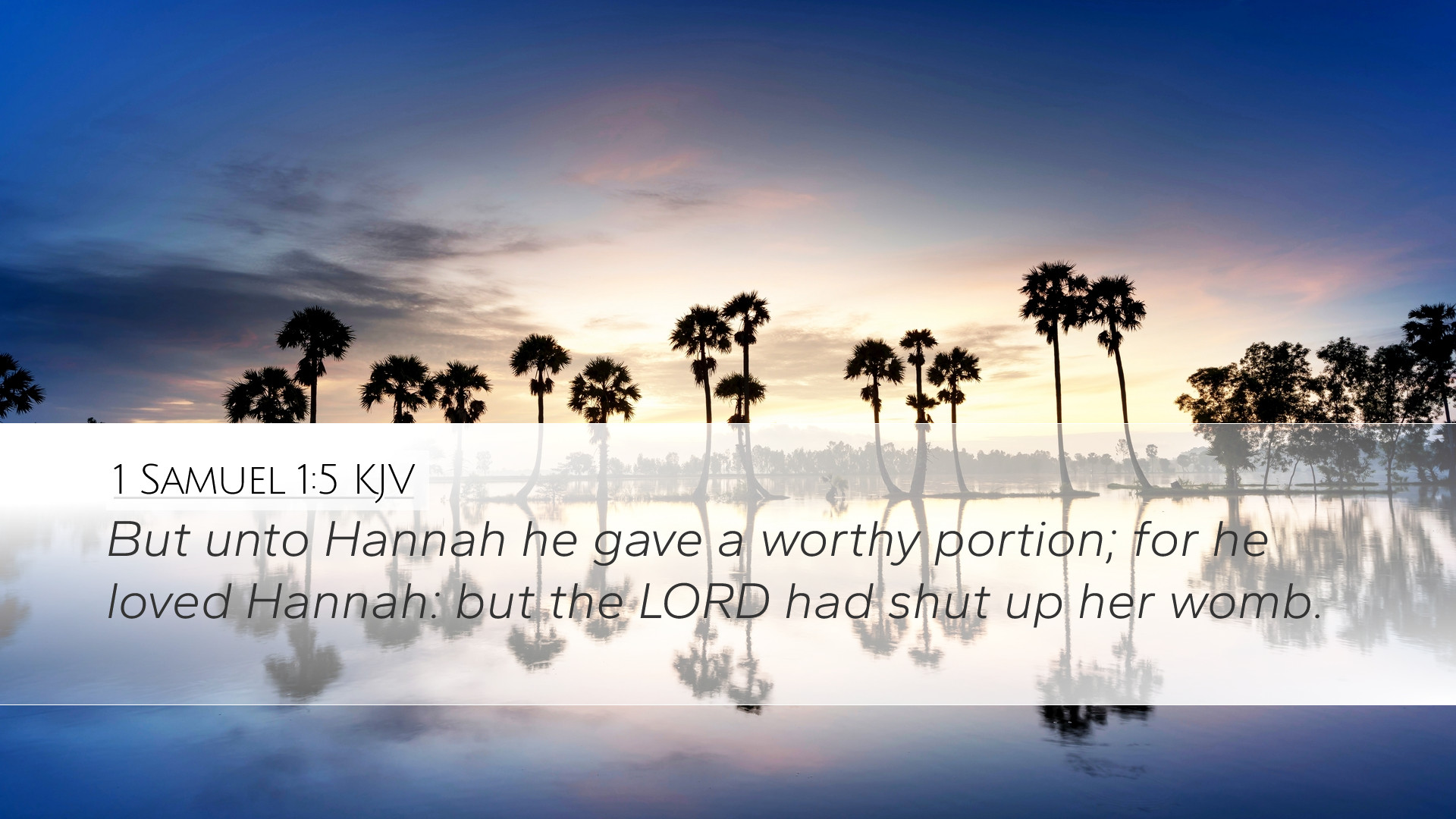Commentary on 1 Samuel 1:5
Verse: 1 Samuel 1:5 - "But to Hannah he gave a double portion; for he loved Hannah, but the Lord had closed her womb."
Introduction
This verse serves as a pivotal point in the narrative of Hannah, one of the most prominent figures within the Old Testament. The emotional landscape of Hannah's life is framed within the context of her deeply felt desire for children and the societal pressures that accompany barrenness. The verse outlines significant themes of love, favor, and divine sovereignty that continue to resonate with contemporary readers and scholars alike.
Exegesis and Contextual Analysis
To properly understand the implications of 1 Samuel 1:5, it is crucial to consider its historical and literary context. The Book of Samuel marks the transition of Israel from a confederation of tribes to a centralized monarchy. Within this framework, the personal struggles of individuals like Hannah highlight the intimate relationship between faith, personal grief, and divine intervention.
Matthew Henry's Commentary emphasizes that Hannah's situation is exacerbated by the societal stigma surrounding childlessness. In a culture where fertility was equated with honor and success, her barrenness was not only a personal tragedy but also a social calamity. Her husband Elkanah's affection, particularly the double portion he provides, underscores the complexity of their relationship amidst societal pressures.
Albert Barnes notes that Elkanah's gesture symbolizes his love and recognition of Hannah's plight. The "double portion" signifies not only material support but also a spiritual acknowledgment of Hannah's noble character. The text indicates that Elkanah loved Hannah despite her inability to bear children, showcasing the importance of unconditional love in marital relationships. However, it hints at the larger narrative of God’s plans that often come through human suffering.
Adam Clarke highlights the phrase "the Lord had closed her womb," pointing to the theological implication that barrenness is not merely a medical condition but a divine act. This notion opens a broader discourse about God's sovereignty and the human understanding of providence. God’s withholding of children from Hannah functions as a divine orchestration for a greater purpose that the narrative progressively reveals.
Thematic Insights
- God’s Sovereignty: The text reflects a profound theological acknowledgment that life events transpire under God’s oversight. Hannah's suffering is not absent from God's plan.
- The Nature of Love: Elkanah's love is presented as a contrasting light against the backdrop of societal disappointment. His double portion to Hannah serves as a poignant reminder of the responsibilities and expectations within marriage.
- Human Longing and Divine Response: The emotional depth of Hannah's longing for children ultimately sets the stage for God's remarkable intervention, revealing that human desires often align with divine purposes.
Pastoral Application
This verse offers substantial insights for pastoral care and counsel. It encourages ministers to address the emotional and spiritual aspects of those dealing with infertility, reminding them that their struggles are acknowledged within scripture. Just as God was present in Hannah's anguish, so too is He present today with individuals facing similar trials. Pastors are encouraged to emphasize the importance of love and support from family and community, reflecting Elkanah's role in Hannah’s life.
Conclusion
1 Samuel 1:5 is more than a historical footnote; it is a rich narrative that encapsulates themes of love, suffering, and divine sovereignty. It invites theologians and scholars to engage deeply with the text while providing vital contexts for modern-day application. The verse serves as a reminder of God’s active role in human history, redemption, and the unfolding of His plans in the face of personal and corporate struggle.


